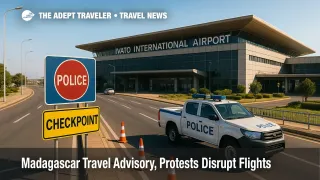Madagascar travel advisory, protests disrupt flights

Escalating protests in Madagascar are reshaping near-term travel plans. Youth-led demonstrations in Antananarivo have drawn in elements of the security forces, prompting fast-moving road closures, localized violence, and embassy shelter-in-place guidance. Air France has paused Paris-Antananarivo service through October 13, with further changes possible. Travelers booked through Ivato International Airport (TNR) or connecting at Paris-Charles de Gaulle Airport (CDG) should expect short-notice schedule shifts, heavier demand on alternative routings via Nairobi or Johannesburg, and intermittent ground-access constraints around the capital.
Key points
- Why it matters: Protests and airport-area disruptions can strand travelers and complicate airport access.
- Travel impact: Air France suspended CDG-TNR flights through October 13 and may adjust operations daily.
- What's next: Embassy alerts suggest more demonstrations, curfews, and checkpoints remain possible.
- FCDO notes roads to the airport have been blocked during unrest in past incidents.
- U.S. State Department rates Madagascar Level 3, reconsider travel, due to unrest and crime.
Snapshot
Demonstrations have intensified in central Antananarivo, especially near 13 May Square and government facilities. The U.S. Embassy advises Americans to shelter in place and avoid protest areas, while the State Department's Level 3 advisory urges travelers to reconsider nonessential trips. On the aviation side, Air France temporarily suspended Paris-Antananarivo flights through October 13, and will reassess operations day by day. While Ivato remains operational, access can be unpredictable when crowds form or checkpoints are set, which can delay airport transfers. Travelers who must transit Madagascar should build large buffers, keep hotel and airline apps enabled for alerts, and prepare overland fallback routes in case primary roads close.
Background
Weeks of youth-led protests over service shortages have evolved into broader political demands, drawing participation from elements of the security forces and raising the risk of larger confrontations. Embassy messaging has cycled through multiple updates over the past week, emphasizing avoidance of demonstrations and a low profile. Historically, unrest in Madagascar has led to rolling disruptions around Antananarivo, with the FCDO warning that roads to the airport have at times been blocked and that some flights have been canceled. Airline decisions generally follow risk assessments by carriers and local authorities, which can change on a daily basis. As cyclone season approaches in November, weather could compound any security-related interruptions to roads, telecoms, and medical access.
Latest developments
Air France pause adds pressure to long-haul connectivity
Air France suspended its Paris-Antananarivo flights from October 11 through October 13, citing security conditions and stating it will evaluate resumption day by day with authorities. Passengers are being offered rebooking or refunds under the airline's irregular-operations policy. With fewer nonstop options into Madagascar, travelers may see spillover demand on regional hubs such as Nairobi and Johannesburg, plus higher short-notice fares and limited award availability. If you are already ticketed, verify your contact details in the booking, enable notifications, and confirm ground-transport options to and from the airport before departing for any flight.
Analysis
Near-term travel risk in Madagascar centers on three variables. First, protest geography and tempo, which determine whether airport-area roads are open, crowded, or blocked, and whether ad hoc checkpoints slow movement. Second, airline risk tolerance, which drives schedule reliability. When a flag carrier like Air France pauses service, other operators often reduce loads, up-gauge capacity elsewhere, or impose rolling waivers, leading to volatile inventory and pricing. Third, traveler services on the ground. Embassy guidance points to a conservative approach, sheltering when protests are active and minimizing movements after dark. For itineraries that must proceed, practical mitigations include daytime-only transfers, verified drivers arranged through hotels, and contingency supplies for a 72-hour delay. Given the State Department's Level 3 posture, nonessential trips should be deferred. Essential travel should be routed with generous layovers, flexible tickets, and a plan to reroute via regional hubs if Antananarivo access degrades.
Final thoughts
If your plans involve Madagascar in the coming days, treat the situation as dynamic and plan for change. Confirm flights frequently, coordinate airport transfers that can adapt to road closures, and monitor embassy alerts before moving around the capital. When in doubt, defer nonessential travel and align decisions with the current Madagascar travel advisory.
Sources
- Demonstrations across Madagascar, October 11, 2025, U.S. Embassy Antananarivo
- Madagascar travel advisory, U.S. Department of State
- Air France suspends flights to Madagascar amid security concerns, Reuters
- Protests and airport access risks in Antananarivo, UK FCDO
- Soldiers join protests, coup allegation context, Al Jazeera
